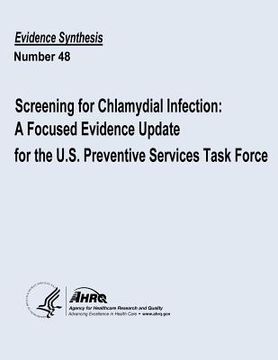Screening for Chlamydial Infection: A Focused Evidence Update for the U.S. Preventive Services Task Force: Evidence Synthesis Number 48 (in English)
Synopsis "Screening for Chlamydial Infection: A Focused Evidence Update for the U.S. Preventive Services Task Force: Evidence Synthesis Number 48 (in English)"
Chlamydia trachomatis is the most common sexually transmitted bacterial infection in the U.S. In 2004, a total of 929,462 cases of chlamydial infection were reported to the Centers for Disease Control and Prevention (CDC). Because many cases are not reported, the actual number of new cases of chlamydial infection is thought to be more than 2.8 million per year. In women, Chlamydia trachomatis commonly results in cervicitis and urethritis. Up to 40% of untreated cases of Chlamydia trachomatis in women progress to pelvic inflammatory disease (PID). Of those with PID, it has been estimated that 20% become infertile, 18% experience chronic pelvic pain, and 9% may have a tubal pregnancy. Chlamydial infection may also increase the risk for cervical cancer. After the acute phase of infection, many women appear to experience a long duration of low-grade infection. Seventy-five to 85%, of genital chlamydial infections in women are asymptomatic. Women with low-grade PID may not experience significant enough symptoms to seek medical attention; yet, these low-grade infections may progress to infertility and chronic pelvic pain. In men, genital chlamydial infection is also likely to be asymptomatic. In one large national sample, only 5% of infected men reported symptoms. Chlamydial infection in men can cause nongonococcal urethritis, acute epididymitis, and, in rare instances, may result in uretheral strictures and Reiter Syndrome. As with other inflammatory sexually transmitted infections (STIs), Chlamydial infection facilitates the transmission of HIV infection in both men and women in both the HIV carrier and recipient. Chlamydial infections are also related to adverse pregnancy outcomes, including miscarriages, premature rupture of membranes, pre-term labor, low birth weight, infant mortality, neonatal chlamydial infection, and postpartum endometritis. In 2001, the United States Preventive Services Task Force (USPSTF) commissioned a systematic review of the evidence on screening for chlamydial infection. Based on this review, the USPSTF found good evidence supporting screening for chlamydial infection among asymptomatic women at increased risk for infection, including women at risk due to young age. It found less evidence regarding screening for chlamydial infection in pregnant women and, based on estimates of benefits and harms, recommended screening for pregnant women at increased risk. At that time, the USPSTF found a major gap in the evidence on the effectiveness of screening men for chlamydial infection for the purposes of reducing the incidence of infection and improving health outcomes among women. In 2005, the USPSTF determined that a brief, focused evidence review was needed to update its 2001 recommendation on screening for chlamydial infection. Staff of the Agency for Healthcare Research and Quality (AHRQ) reviewed the literature published on this topic between July 2000 and July 2005 and prepared this evidence update.

